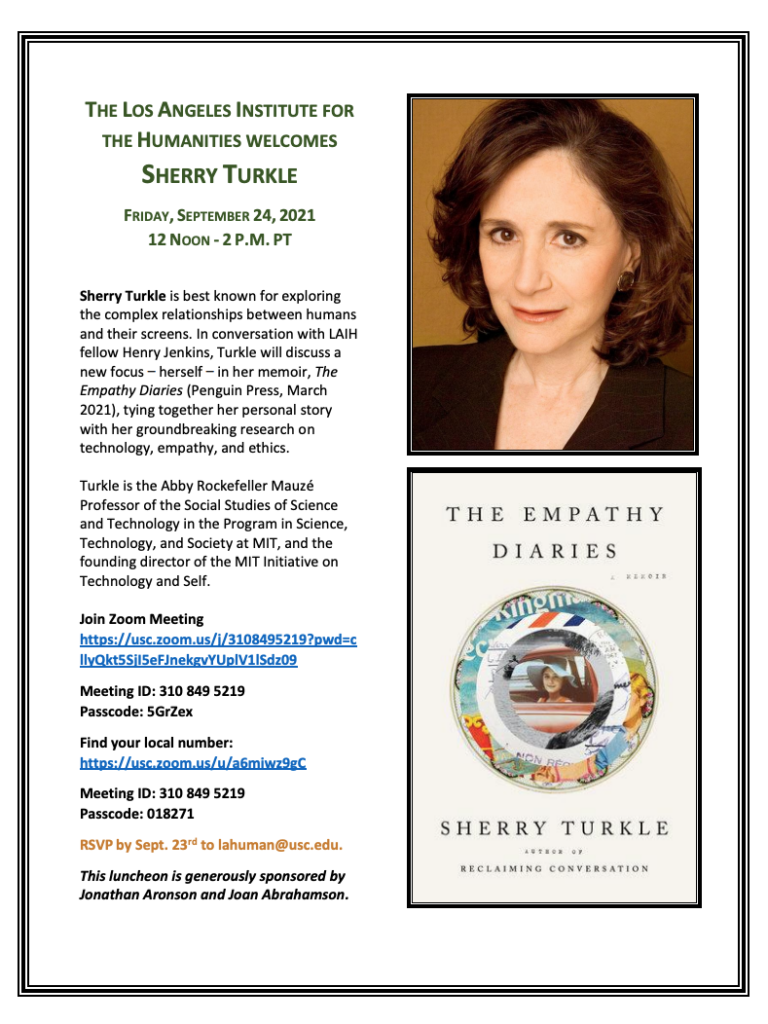
September 24: Our guest is Sherry Turkle, the Abby Rockefeller Mauzé Professor of the Social Studies of Science and Technology in the Program in Science, Technology, and Society at MIT, and the founding director of the MIT Initiative on Technology and Self.
Turkel, who is best known for exploring the complex relationships between humans and their screens, will be in conversation with LAIH fellow Henry Jenkins, discussing a new focus – herself – in her memoir, The Empathy Diaries (Penguin Press, March 2021), tying together her personal story with her groundbreaking research on technology, empathy, and ethics.

October 8: In September 2020, Jennings became the newspaper’s first assistant managing editor for culture and talent, part of the media company’s efforts to reform hiring practices, increase staff diversity and overhaul how it treats Black and Latino journalists and communities.
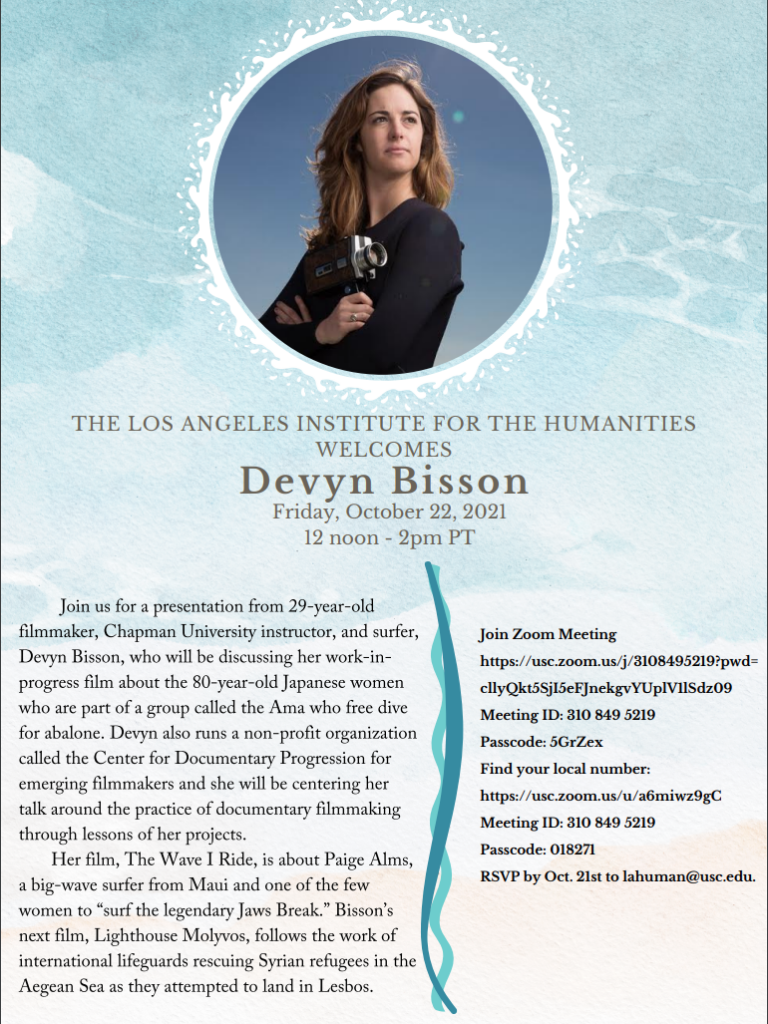
October 22: A presentation from 29-year-old filmmaker, Chapman University instructor, and surfer, Devyn Bisson, who will be discussing her work-in-progress film about the 80-year-old Japanese women who are part of a group called the Ama who free dive for abalone. Devyn also runs a non-profit organization called the Center for Documentary Progression for emerging filmmakers and she will be centering her talk around the practice of documentary filmmaking through lessons of her projects.
Her film, The Wave I Ride, is about Paige Alms, a big-wave surfer from Maui and one of the few women to “surf the legendary Jaws Break.” Bisson’s next film, Lighthouse Molyvos, follows the work of international lifeguards rescuing Syrian refugees in the Aegean Sea as they attempted to land in Lesbos
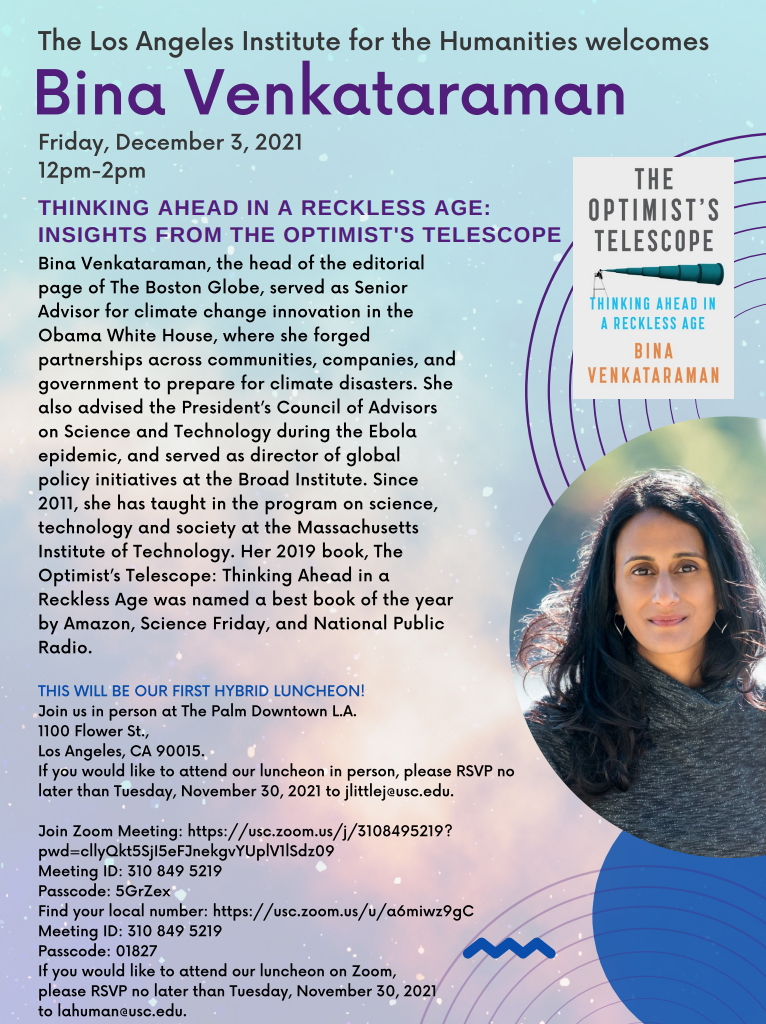
December 3: Venkataraman is the head of the editorial page of The Boston Globe and served as Senior Advisor for climate change innovation in the Obama White House, where she forged partnerships across communities, companies, and government to prepare for climate disasters. She also advised the President’s Council of Advisors on Science and Technology during the Ebola epidemic, and served as director of global policy initiatives at the Broad Institute. Since 2011, Venkataraman has taught in the program on science, technology and society at the Massachusetts Institute of Technology.
Her 2019 book, The Optimist’s Telescope: Thinking Ahead in a Reckless Age was named a best book of the year by Amazon, Science Friday, and National Public Radio.
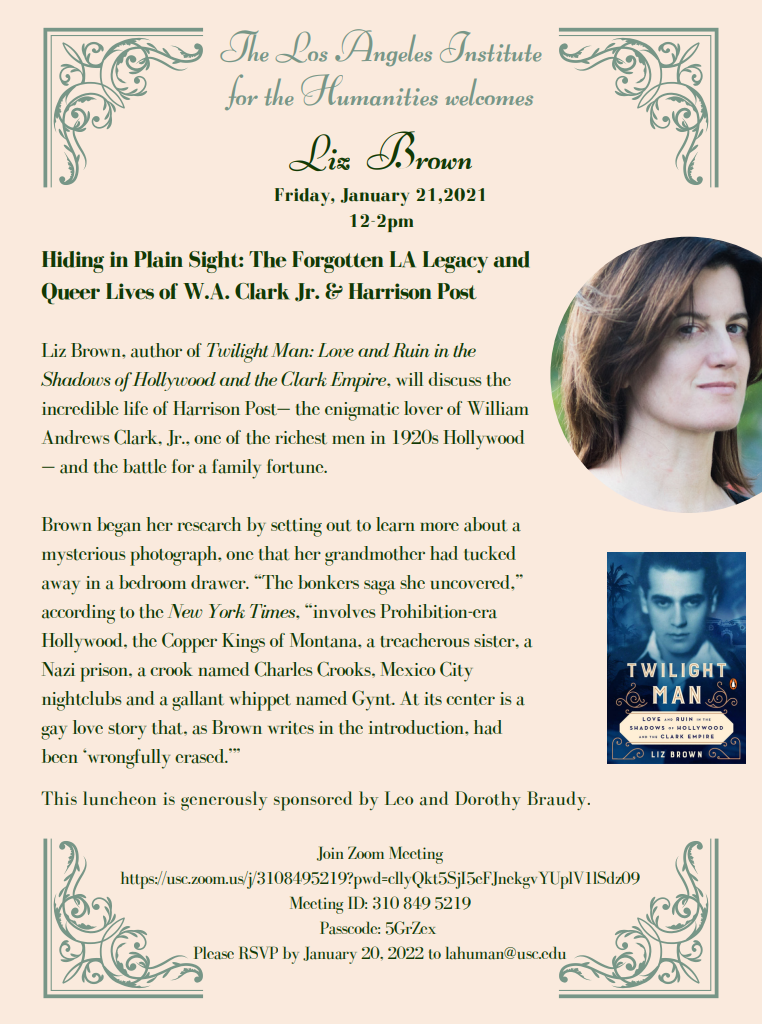
January 21: In her presentation, “Hiding in Plain Sight: The Forgotten LA Legacy and Queer Lives of W.A. Clark Jr. & Harrison Post,” Brown, author of Twilight Man: Love and Ruin in the Shadows of Hollywood and the Clark Empire, will discuss the incredible life of Harrison Post— the enigmatic lover of William Andrews Clark, Jr., one of the richest men in 1920s Hollywood— and the battle for a family fortune.
Brown began her research by setting out to learn more about a mysterious photograph, one that her grandmother had tucked away in a bedroom drawer. “The bonkers saga she uncovered,” according to the New York Times, “involves Prohibition-era Hollywood, the Copper Kings of Montana, a treacherous sister, a Nazi prison, a crook named Charles Crooks, Mexico City nightclubs and a gallant whippet named Gynt. At its center is a gay love story that, as Brown writes in the introduction, had been ‘wrongfully erased.’”
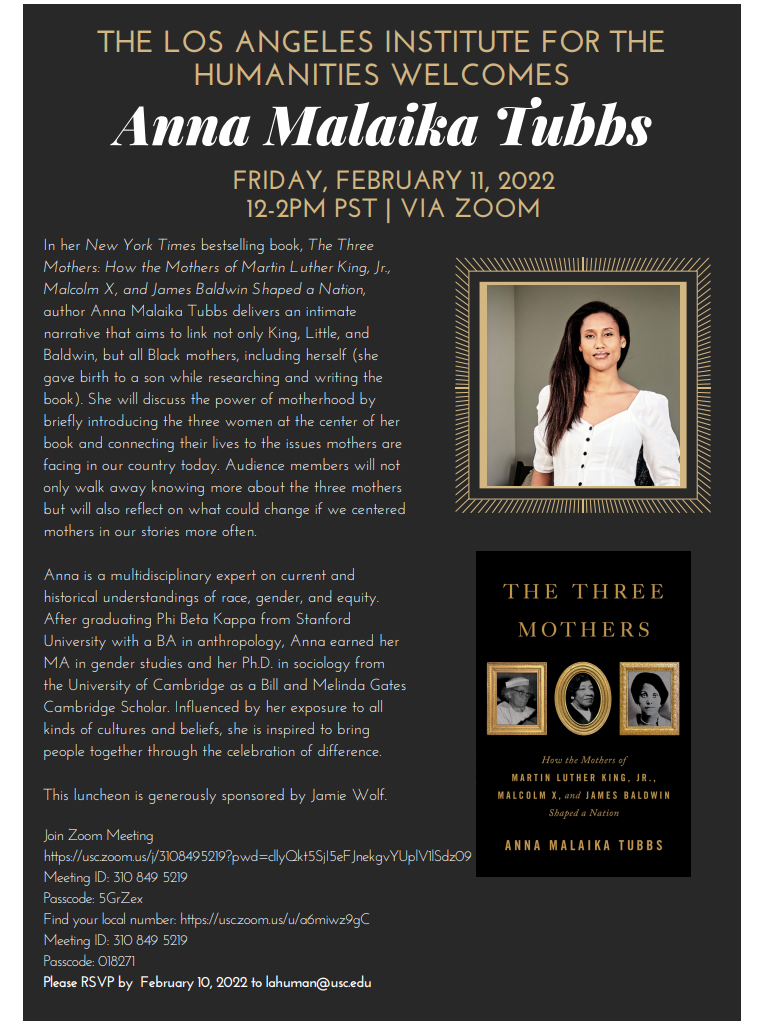
February 11: Anna Malaika Tubbs will discuss the power of motherhood by briefly introducing the three women at the center of her book – Alberta King, Berdis Baldwin, and Louise Little – and connecting their lives to the issues mothers are facing in our country today. Audience members will not only walk away knowing more about the three mothers but will also reflect on what could change if we centered mothers in our stories more often.
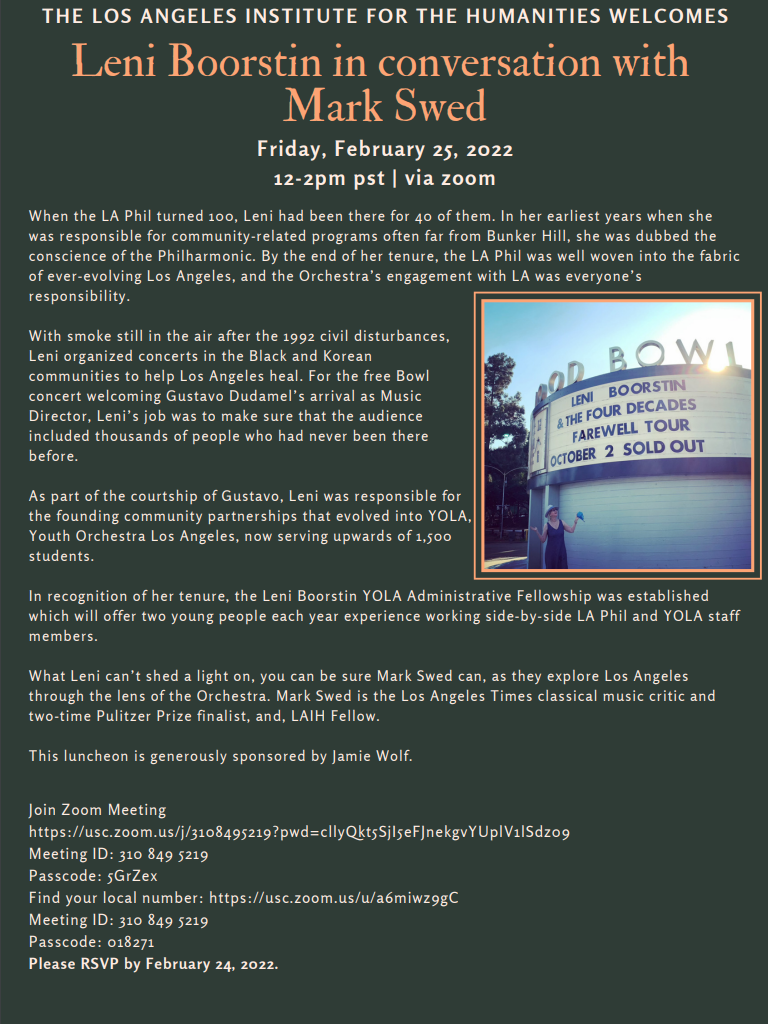
February 25: When the LA Phil turned 100, Leni had been there for 40 of them. In her earliest years when she was responsible for community-related programs often far from Bunker Hill, she was dubbed the conscience of the Philharmonic. By the end of her tenure, the LA Phil was well woven into the fabric of ever-evolving Los Angeles, and the Orchestra’s engagement with LA was everyone’s responsibility.
What Leni can’t shed a light on, you can be sure Mark Swed can by drawing on his experiences as the Los Angeles Times classical music critic, two-time Pulitzer Prize finalist, and LAIH Fellow.
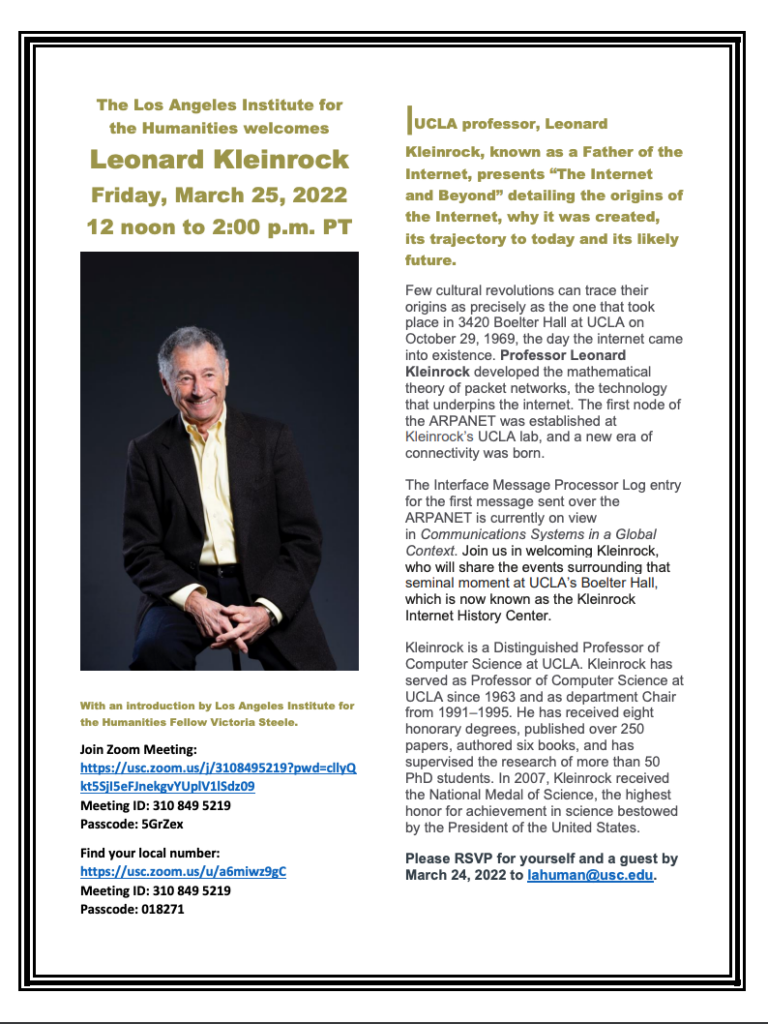
March 25: Few cultural revolutions can trace their origins as precisely as the one that took place in 3420 Boelter Hall at UCLA on October 29, 1969, the day the internet came into existence. Kleinrock developed the mathematical theory of packet networks, the technology that underpins the internet. The first node of the ARPANET was established at Kleinrock’s UCLA lab, and a new era of connectivity was born.
The Interface Message Processor Log entry for the first message sent over the ARPANET is currently on view in Communications Systems in a Global Context. Join us in welcoming Kleinrock, who will share the events surrounding that seminal moment at UCLA’s Boelter Hall, which is now known as the Kleinrock Internet History Center.
Kleinrock is a Distinguished Professor of Computer Science at UCLA. Kleinrock has served as Professor of Computer Science at UCLA since 1963 and as department Chair from 1991–1995. He has received eight honorary degrees, published over 250 papers, authored six books, and has supervised the research of more than 50 PhD students. In 2007, Kleinrock received the National Medal of Science, the highest honor for achievement in science bestowed by the President of the United States.
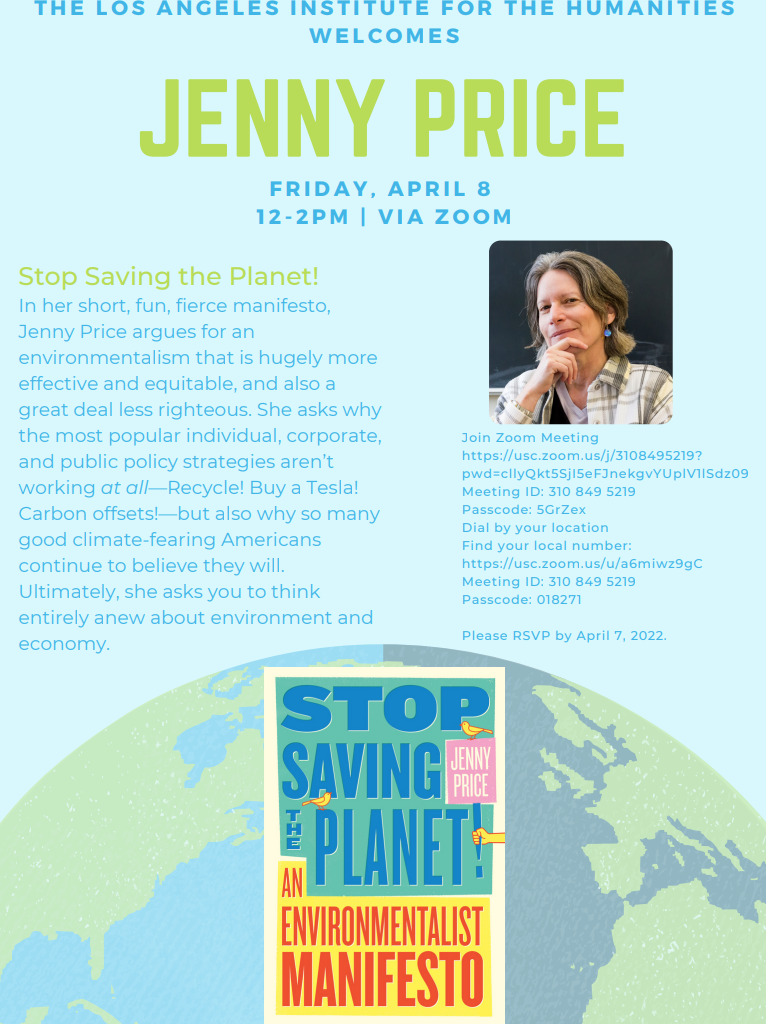
April 8: In her short, fun, fierce manifesto, Jenny Price argues for an environmentalism that is hugely more effective and equitable, and also a great deal less righteous. She asks why the most popular individual, corporate, and public policy strategies aren’t working at all—Recycle! Buy a Tesla! Carbon offsets!—but also why so many good climate-fearing Americans continue to believe they will. Ultimately, she asks you to think entirely anew about environment and economy.
Contact Us
University of Southern California
Doheny Memorial Library 241
Los Angeles, California
90089-0189